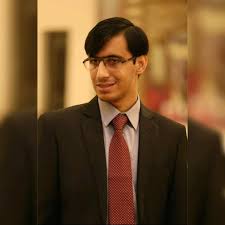 Yousaf Saleem, the visually impaired lawyer, is set to become the first blind judge in Pakistan, according to a report in The News International.
Yousaf Saleem, the visually impaired lawyer, is set to become the first blind judge in Pakistan, according to a report in The News International.
Saleem, who was earlier dropped for being blind, has been reconsidered and recommended for the position of the civil judge after intervention by Chief Justice of Pakistan (CJP) Mian Saqib Nisar.
A gold medalist of the Punjab University in LLB (Honours), Yousaf had topped the written judiciary exam among 6,500 candidates. He was amongst 21 candidates, who qualified for interview. However, he failed in interview as he was blind.
As The News International reported this issue on April 22, the CJP took suo motu notice. The chief justice observed that a person could be a judge even if he is blind, provided he meets all other qualifications.
“It appears in this case, his fundamental rights under Articles 9, 14 and 25 of the Constitution, the provisions of the UN Conventions on the Rights of Persons with Disabilities, ratified by Pakistan, three percent quota under the Disabled Persons (Employment and Rehabilitation) Ordinance 1981, and the jurisprudence developed by the Lahore High Court in PLD 2017 Lahore 406 and PLD 2017 Lahore 1 were not considered by the Lahore High Court,” reads the SC press release on suo motu.
The CJP referred the matter to the chief justice Lahore High Court and the relevant selection committee directing them to reconsider the case and “give a speaking opinion.”
Yousaf’s prayers were finally answered on Saturday when he received a letter from the LHC that reads: “You are hereby informed that the Hon’ble Examination Committee for Recruitment of District Judiciary and Lahore High Court Establishment has recommended you for appointment as Civil Judge-cum-Magistrate.”
Talking to The News, Yousaf thanked the CJP for taking notice of the situation and the chief justice of Lahore High Court and selection committee for reconsidering his case.
While he is going to be the first blind judge in Pakistan, there are numerous examples of visually-impaired judges in other countries.
Justice Zakeria Mohammed Yacoob was the judge of the Constitutional Court of South Africa from 1998-2013, Richard Conway Casey was judge of the United States District Court for the Southern District of New York, John Lafferty was a judge of the Snaresbrook Crown Court (Snaresbrook is the UK’s largest court with 20 Crown courts serving in London), Richard Teitelman is a judge in Missouri; David Tatel sits on a federal appeals court in Washington DC, Richard Bernstein is a judge of the Michigan Supreme Court; T Chakkaravarthy is a judge in Tamil Nadu (India), and Brahmananda Sharma is a civil judge in Ajmer District (India) among others.
Son of a chartered accountant, Yousaf is blind by birth. He has four sisters of which two are also blind. None of them accepted disability as fate and proved worth through the ability they possess.
Saima Saleem, the first blind person who did CSS in 2007 is his sister. A gold medalist in English from Kinnaird College, Saima had scored the sixth position and opted for the Foreign Service.
She was posted in Pakistan’s UN missions in Geneva and New York. Right now, she is in the Prime Minister Secretariat working as deputy secretary.
Yousaf’s another blind sister teaches at a university in Lahore and is also doing her PhD. Yousaf is the youngest among siblings.
Yousaf has though lost vision, he has not lost sight of his dreams. He wants to become the Chief Justice of Pakistan.
Like Martin Luther King, he has a dream that when he would rise to the summit of Supreme Court, people like him will be judged by their qualifications and personal attributes and not by how many functional limbs do they possess.
